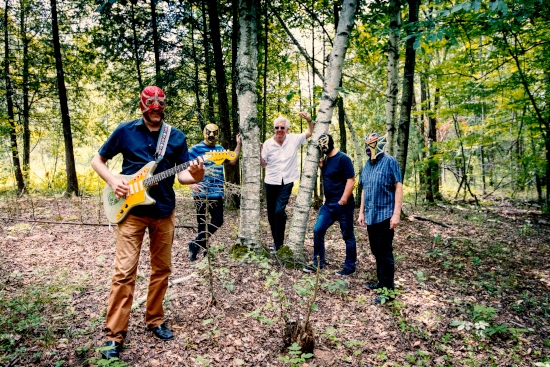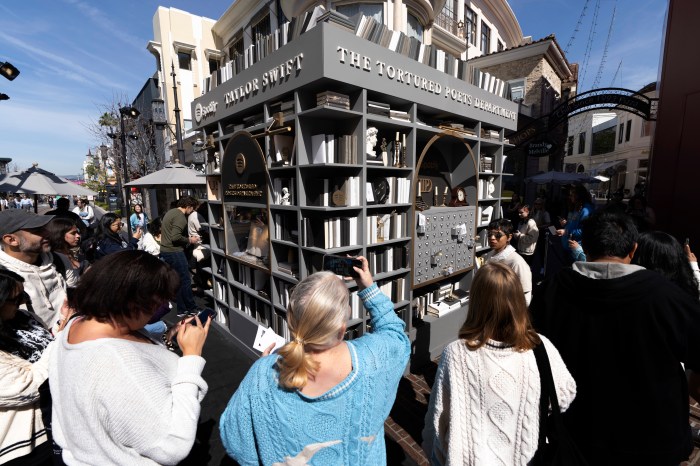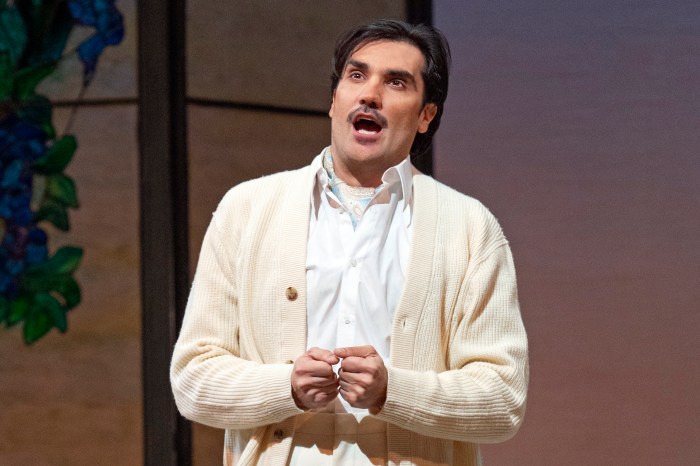To know anything about legendary British songwriter Nick Lowe is to know that he has always approached music as though it was just another job that needs to get done. He just happens to do that job incredibly well.
As a producer he helped to create some of the most defining rock records of the ’70s punk and New Wave era as well as writing such classic songs as “What’s So Funny ‘Bout Peace Love and Understanding,” “Cruel to Be Kind,” “So it Goes,” and “I Love the Sound of Breaking Glass.”
Recently, Lowe has been touring the globe with the lucha libre masked surf-rock band Los Straitjackets as his backing band and treating fans old and new to one of the most eclectic and celebrated catalogs in all of rock ’n’ roll. We caught up with Lowe to talk about this fruitful collaboration and the power of writing simple songs.
Heading back to work with Nick Lowe
How did your partnership with Los Straitjackets come about?
Nick Lowe: Well, I’ve known them for quite a long time from bumping into them on the circuit, so to speak, but we also share a manager. And about, it’s longer ago than it seems actually, about six years ago I released a Christmas record, which enjoyed a surprising amount of success in the United States.
Shortly after it was released, two of my main musical collaborators that I’d been with for years and years and also had become quite close friends with, died. One after the other, I couldn’t promote the record. The next Christmas came around, I just couldn’t do it. I let the wind out of my sail, and I just couldn’t make it out there. Anyway, with the passing of time, it was suggested by my manager and by Straightjackets’ manager that why don’t I do a few Christmas shows with the Straitjackets, which we did, and they were pretty good.
We did it the next year, somewhere along the West Coast, and the next year somewhere else, and then we came to Europe, and we did a bunch of shows here all over countries in Europe, and it was really good fun. But, we felt we had done that then. But along comes offers. We started to get offers to do what you might describe as out of season work, and that took off, people really went for that. So that’s when we really get a kick out of doing it.
Your career is so defined by your workmanlike approach to music. Do you enjoy giving yourself assignments like that?
Nick Lowe: Oh, you mean with the Christmas record, for instance? Oh yeah, when it was suggested to me. I never would have thought of doing it, because in the U.K. to put out a Christmas album it was seen as kind of vulgar. I think it got a good laugh, the great, great Christmas songs are all American, from what I can see. You guys seem to take it all with a pinch of salt, over here people just do the same 10 tunes. It’s almost like they don’t know that there are way more! So my initial reaction when it was first put to me was “Oh, dear, who do you think I am? Don’t you know that I’m an internationally celebrated songwriter? I’m not dirtying my hands on something as…” Well, that thought lasted for about three and a half seconds, and it was immediately replaced by, wait a minute, this could be a really good laugh! And you know, I phoned up my pals, and we got down to it straight away, deciding what tunes we were going to do and things like that. It was really good fun.
I’ve read a quote of yours where you said you like to write a song as though it is a cover. Like some stranger is coming up with those emotions and narratives. Is the protagonist unrecognizable when you look back at some of your older songs?
Nick Lowe: With the best stuff, yes, it’s like someone else has done it. That’s the best when I can listen back and hear myself going to work in some of the old records. Which frankly isn’t very often, but occasionally they’ll play one of my records on the radio and sometimes I’ll be quite pleased.
But when it comes to writing songs especially now that I’m older, and it’s still a mysterious process, it’s something you can’t turn on or indeed turn off, when you’re in the mood. When one’s come along, suddenly you’ll get a bite and you realize that you’re onto something and I’ll turn the thing over in my mind.
The great thing about being a songwriter is that you can write songs anywhere, you’re doing the shopping, filling your car with gas, you know, especially driving, sitting on the train, you could be walking down the street thinking and working on your song. But I turn the thing over in my mind over and over again, until like you just said, that I start to believe I’m singing a cover song. And the opposite is true when I get onto a cover, you know a cover that I like. If I hear a song that people haven’t heard millions of times before, if I find some old song where I’m like “boy, that’s good.” I’ll turn it over and over again in my mind, and I’ll work on it and work on it, until I start to believe that I wrote it. And you wind up at the same place. It feels like an old coat. that you just put on and it feels totally natural, but isn’t quite yours. You know, I don’t really like the stuff that I do that sounds like me, you know what I perceive that sounds like me, you know I always inwardly groan, “oh God not that old thing again, here it comes.”
Are you still mystified when you stumble upon a simple song?
Nick Lowe: Oh yeah, it’s the greatest thing to do a simple song. One with three chords. One chord is even better, and it is possible to do! It’s perfectly possible to do it with one cord. Well, it’s possible but very, very difficult. It’s got to sound natural, it’s got to sound cool and surprising. So the intervals, where the rhythm of the song is, the intervals have to be surprising. Like in blues. The way old blues singers used to phrase their stuff is just brilliant, mysterious, and difficult to catch. Because normally, your ear is attracted to a certain symmetry in a song, and a one-note symmetry is pushed out, pushed to an unusual place. But it’s still symmetrical and a wonderful feeling, but it’s ever so difficult to achieve it naturally.
I am going to try to forgo asking any questions about whether the meaning of the song “What’s So Funny ‘Bout Peace Love and Understanding” has changed for you throughout the years. Instead, I’ll ask if have you ever seen the song be butchered by a cover band?
Nick Lowe: (laughs) The funny thing is that because there’s a reason why it’s been covered by so many people. It’s a very simple and direct song. It’s kind of a miracle really. It’ll take any kind of treatment. It can’t be massacred too badly, I suppose is what I’m saying. It’s a tune everyone knows and the chorus, everyone can belt it out. The thing that I marvel about really is that I was very young when I wrote that song, and probably if you’ve read interviews and I’ve gotten asked about it and I’m asked about it quite a lot, I always will say it was the first original thought I had. When I was learning how to write songs I would just rewrite my hero’s catalog and then just move along to another hero and rewrite their catalog. And then one day, you put a little bit of the early heroes into some of the later heroes, and you start coming up with your own recipe.
Then one morning I came up with this idea, “What’s so Funny ‘Bout Peace, Love and Understanding”. I couldn’t believe it. I actually have had an original thought! Nobody’s thought of this. I remember being quite astonished that I hadn’t just stolen something, I mean not stolen because everyone needs to come somewhere, it’s all quite benign. And we weren’t selling any records so there was nothing for another writer to get cross about, but to come up with an original thought as I did was an amazing thing. And what was surprising to me was that I can remember thinking “don’t mess this up”. I remember thinking the title is so strong, that I consciously thought that when you do the verses you can make them almost kind of full of cliches about walking through the valley of shadow or death or whatever, it’s one of those songs I can do when I’m singing but I can’t actually remember what I said now, but I remember consciously thinking that and now, at the advanced age I am, however many years ago, it’s getting into fifty years, it was quite a sophisticated song for me to write especially because I was such an idiot when I was 22 years old or whatever it was. That is the thing I found remarkable, if I had made it too clever, that I was prone to do back then, if I had made it too clever and tricksy and hey everyone it’s me, I don’t think it would have been too popular. It’s got a sort of majesty about it, and I got Elvis Costello to thank for that. He’s the one who dug it out of the trash can where it went with the other British rock songs when we broke up. And he was the one who really put the hurt on it and made it popular.
I don’t think I am alone in saying that Rockpile was one of the great rock bands. In the past, festivals have paid bands huge amounts of money to reunite. Have you Dave Edmunds, Terry Williams, and Bill Bremner ever been approached to by these festivals to reform the band? Would you ever consider getting back together?
Nick Lowe: I would not consider it really, we have been approached. But I wouldn’t think, for two reasons really. I think the reputation that we all enjoy is more valuable than the huge bag of money that they’d spit at us to do a few shows, and we have been approached by it especially Japan. The Japanese are absolutely always asking but I think for four old geezers to get on stage and sort of limp through a few of those tunes. I think it would be a sad old sight. So I wouldn’t do it for certain. Terry, the drummer, doesn’t play the drummers anymore. And also Edmunds has pretty much given up playing now. So it’s not going to arise, but every time I go to the stage at some point someone will ask about Rockpile, in the streets or backstage at a show or something, and I look at them and I think this person wasn’t when we were going, but here they are with their eyes all shining, asking about Rockpile. It is incredible how the work we did, the endless touring we did back in the 1970s when we first came to the United States, was a major reason why I’m lucky enough to enjoy such an amazing audience in the US, who just don’t forget Rockpile. And I think it’s a real pity Edmunds, and we’ve kind of fallen in and out, and I’d love to see him but he’s kind of a reclusive guy, and he always has been. I think it’s such a shame that he hasn’t enjoyed the same luck as I have, to go over there and play to people who just love that band.




















